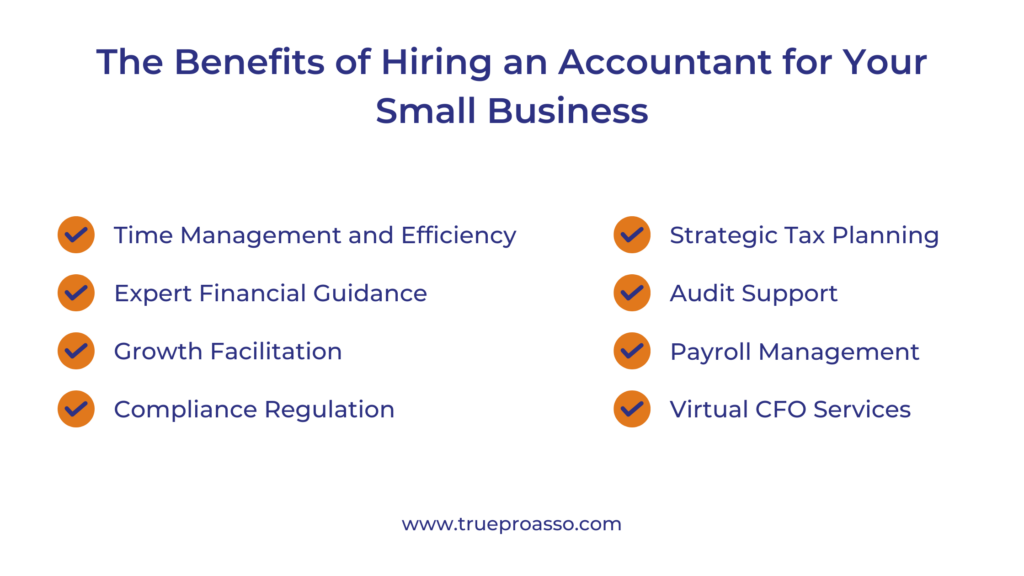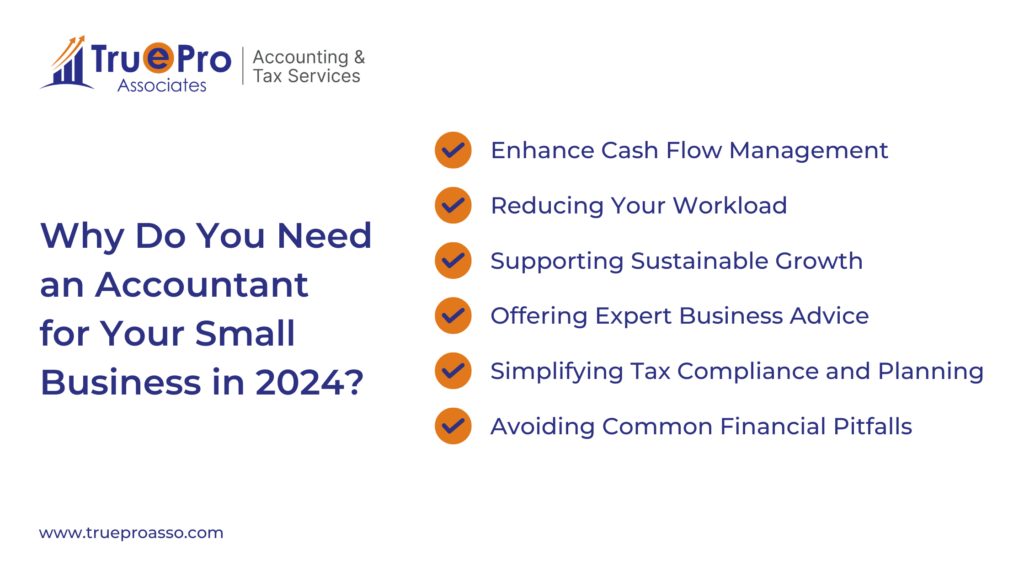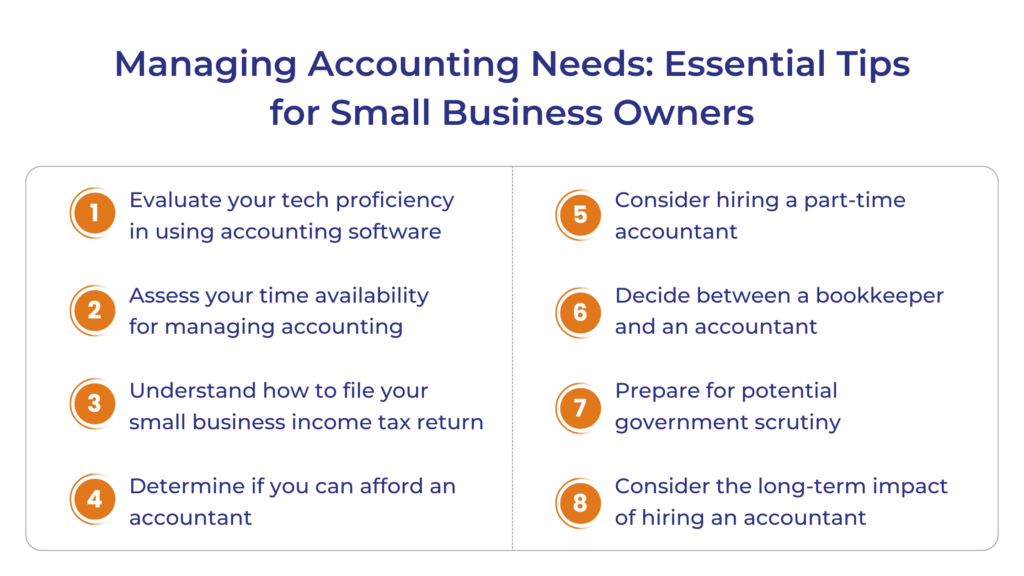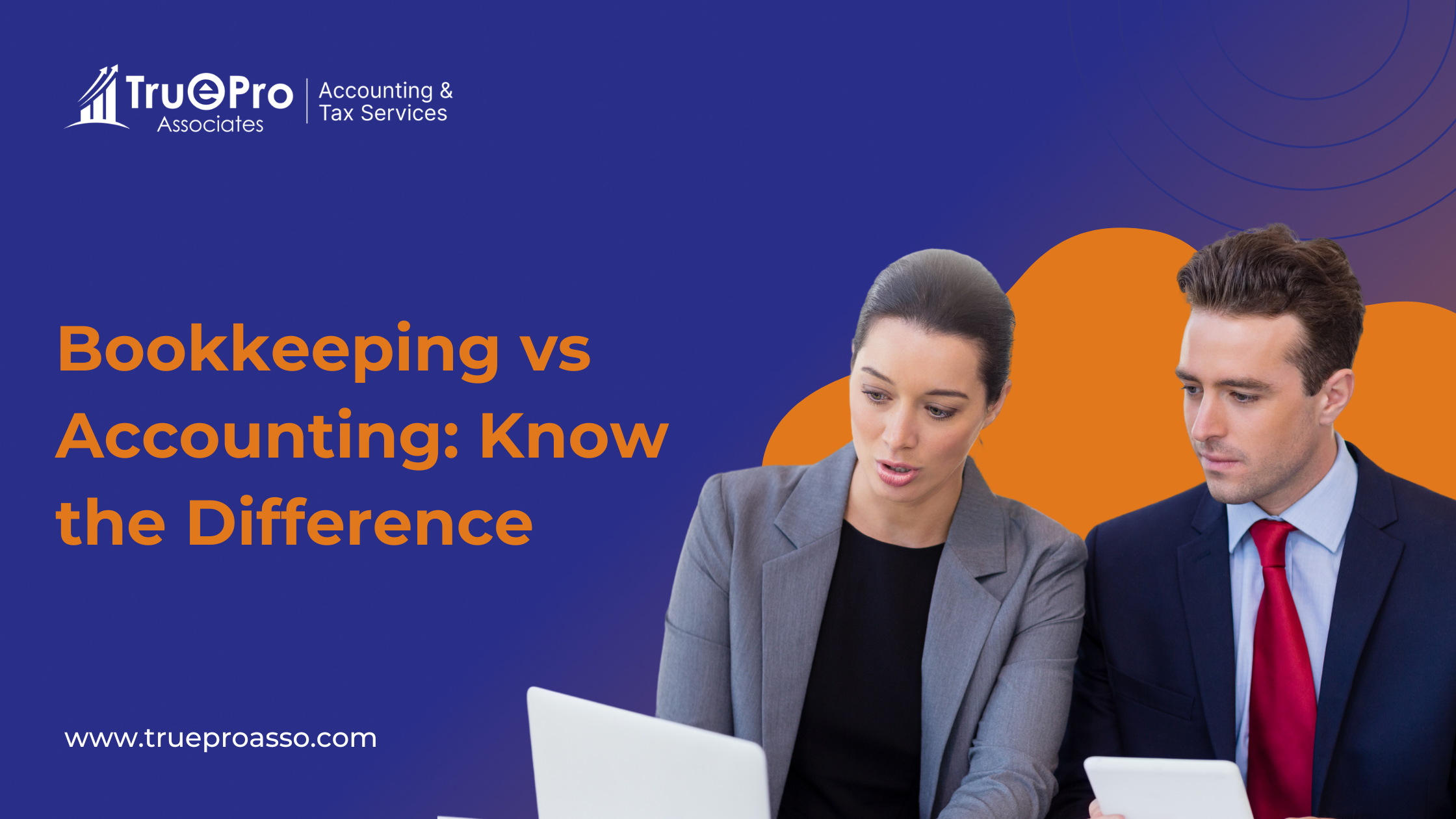Are you familiar with the basics of accounting?
Do you know how to categorize your expenses for optimal tax benefits?
Are you confident in your ability to forecast next quarter’s budget?
If these questions seem confusing or keep coming up in business talks, it might be time to consider hiring an accountant. Understanding accounting fundamentals is crucial for managing your business effectively.
An accountant can help you manage your financial tasks and provide you with a clear picture of your business’s financial statements. This blog will discuss why you need an accountant for a small business and how it will benefit your business’s growth.
The Benefits of Hiring an Accountant for Your Small Business

You need to hire an accountant for your small business to enhance operational efficiency and achieve financial health. Here’s how an accountant for small business can transform your business:
- Time Management and Efficiency: Hiring an accountant for a small business allows you to focus more on core business activities. By delegating bookkeeping and administrative tasks, you save valuable time that can be spent on growth and development.
- Expert Financial Guidance: Considering the complexity of tax laws, every growing company needs an accountant for small business efficiency. An accountant for a small business offers crucial strategic advice, from choosing the right business structure to understanding financial statements and tax planning.
- Growth Facilitation: Business owners who work with accountants can identify potential areas for expansion by analyzing cash flow patterns and financial statements. Accountants can also advise on inventory management, pricing strategies, and securing business financing.
- Compliance Regulation: A small business tax accountant ensures that your business adheres to tax laws and regulations, helping you avoid penalties and take advantage of available tax benefits.
- Strategic Tax Planning: A personal tax accountant helps manage your taxes efficiently, from estimating quarterly taxes to advising on compliance with sales tax regulations, reducing overall tax liability, and avoiding penalties.
- Audit Support: If you need an audit, having a small business accountant ensures you’re well-prepared and properly represented, which reduces stress and minimizes potential financial discrepancies. You may need an accountant to offer professional guidance and ensure your financial management is up to standard.
- Payroll Management: Accounting and payroll for small businesses are crucial to maintaining employee satisfaction and complying with regulations. Accountants ensure payroll is processed accurately and on time.
- Virtual CFO Services: For businesses not ready to hire a full-time CFO, virtual CFO services offer top-tier financial expertise at a fraction of the cost. They help with budgeting, forecasting, and strategic planning.
Why Do You Need an Accountant for Your Small Business in 2024?

As we’ve already detailed the benefits of hiring an accountant, you must always remember that the best accountant for small businesses enhances your financial management with expert advice and precision. Here’s how an accountant can play an important role in various aspects of your business management:
1. Enhance Cash Flow Management
An accountant ensures you have robust credit control and cash management policies, helping maintain a healthy cash flow. For example, a restaurant might struggle with seasonal fluctuations in cash flow; an accountant can help plan for these variations to keep the business stable year-round.
2. Reducing Your Workload
As your business grows, administrative tasks can become very difficult to handle. An accountant takes over financial and tax obligations, such as helping you file taxes and freeing you to focus on core business activities. This shift allows you to dedicate time to strategic growth and customer engagement.
3. Supporting Sustainable Growth
Accountants assist in managing growth challenges, such as funding requirements and cash flow management. They provide strategic insights that help you scale your business effectively. For instance, an expanding online retailer will benefit from an accountant’s advice on inventory management and optimal pricing strategies to maximize profits.
4. Offering Expert Business Advice
With their broad experience, accountants serve as invaluable advisers. They can offer an unbiased perspective on your business plans and alert you to opportunities and risks. Their extensive network can also connect you with important resources.
5. Simplifying Tax Compliance and Planning
A small business tax accountant ensures your tax compliance and optimizes your tax position. This role is crucial in avoiding costly penalties and maximizing tax benefits. So consider hiring the best accountant for small businesses to maximize your tax benefits and minimize your liabilities.
6. Avoiding Common Financial Pitfalls
Accountants help you avoid common financial mistakes that could minimize your business’s progress. They also inform you about the latest financial regulations and help you adhere to them. Choosing the best accountant for a small business is key to ensuring meticulous financial oversight and strategic planning.
Accountants for small businesses provide a foundation of solid financial management that supports all other aspects of your business. When you hire an accountant for a small business, you gain a trusted advisor who can provide valuable insights into financial strategies and help drive your business growth.
Managing Accounting Needs: Essential Tips for Small Business Owners

Managing your small business finances efficiently is crucial for success. Here are some practical tips to help you navigate the accounting aspects of your business effectively:
1. Evaluate your tech proficiency in using accounting software
If you’re not fully comfortable with advanced technology, consider user-friendly accounting software to simplify your processes. Consulting with an accountant is advisable for the best results and system maintenance.
2. Assess your time availability for managing accounting
If your schedule is already packed with business commitments, delegating your accounting tasks to a professional can save you valuable time and reduce stress, enabling you to concentrate on core business operations.
3. Understand how to file your small business income tax return
Tax filing can be challenging, especially for new business owners. An accountant can help you utilize tax breaks such as those available under the Tax Cuts and Jobs Act and ensure accurate filings.
4. Determine if you can afford an accountant
Costs for small business accountants vary depending on their expertise and their services. Compare the potential financial advantages against the costs to decide if hiring an accountant is feasible for your budget.
5. Consider hiring a part-time accountant
A part-time accountant could be cost-effective if your accounting needs do not justify a full-time position. They can handle your financial documentation and provide strategic financial advice without the expense of a full-time salary.
6. Decide between a bookkeeper and an accountant
Small business online accounting services or a bookkeeper might be adequate for simpler financial management tasks. They can manage day-to-day transactions at a lower cost. However, an accountant is recommended for more complex financial planning and tax issues.
7. Prepare for potential government scrutiny
Employing a certified public accountant (CPA) is necessary if you are facing government audits or complex compliance requirements. CPAs can effectively represent your business during IRS dealings and ensure your financial statements are robust against scrutiny.
8. Consider the long-term impact of hiring an accountant
While self-managing finances might be feasible, hiring an accountant can provide deeper insights and free up your time to focus on strategic decisions, which is vital for your business’s long-term success.
This will help you make informed decisions about your small business’s accounting needs and maintain a strong and compliant financial foundation.
Simplify Your Accounts with TruePro Associates

Now that you understand why you need an accountant for your small business, you should consider TruePro Associates for your accounting and tax-related requirements.
We offer comprehensive accounting services tailored to your individual and business needs.
Why Choose TruePro Associates?
- Expertise you can trust
- Customized solutions
- Transparent pricing
Schedule a consultation and learn how we can assist you in achieving your accounting and financial goals.
FAQs
Q1. Is there a need for accountants in the future?
Ans. Yes, the need for accountants in small businesses is expected to grow. As financial regulations become more complex and businesses seek to optimize their financial strategies, hiring the best accountant for small businesses will become increasingly important for ensuring compliance and enhancing efficiency.
Q2. Can I file accounts without an accountant?
Ans. While it’s possible to file accounts without an accountant, it’s not advisable for most businesses. An accountant ensures accuracy and compliance with the latest tax laws and can help maximize your financial benefits. For small businesses, accountants provide essential support that can prevent costly errors.
Q3. What are the golden rules of accounting?
Ans. The golden rules of accounting include three fundamental principles: debit the receiver and credit the giver; debit what comes in and credit what goes out. Understanding these rules can help maintain accurate books, but accountants for small businesses can ensure these principles are applied correctly to safeguard financial health.
Q4. What happens if there is no accountant?
Ans. Small businesses may struggle with financial management challenges such as tax compliance, financial planning, and cash flow management without an accountant. This can lead to missed opportunities for savings, financial penalties, or even legal issues. Therefore, hiring an accountant for small businesses to manage these critical aspects effectively and avoid potential pitfalls is advisable.







